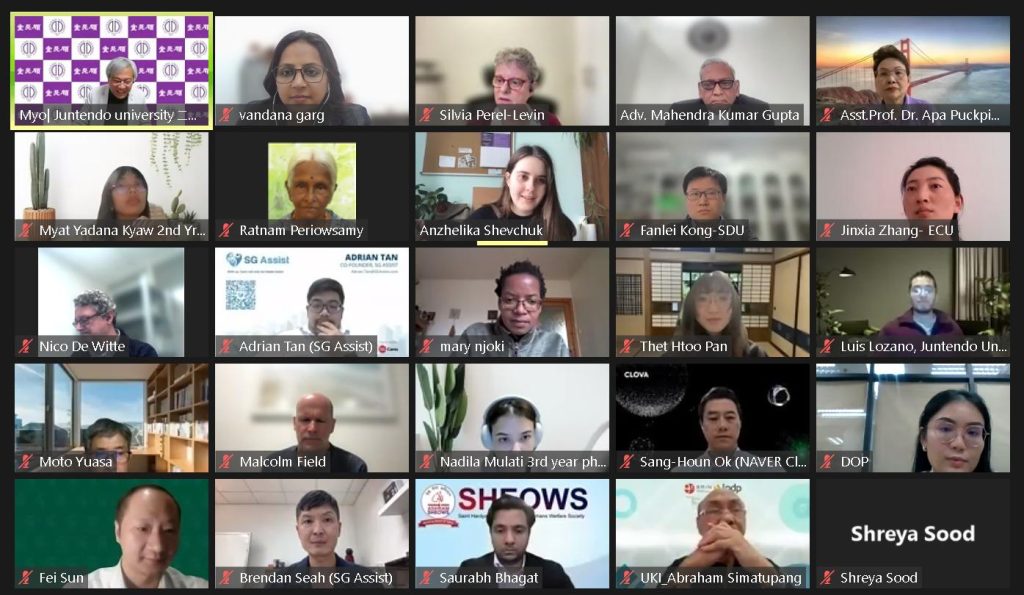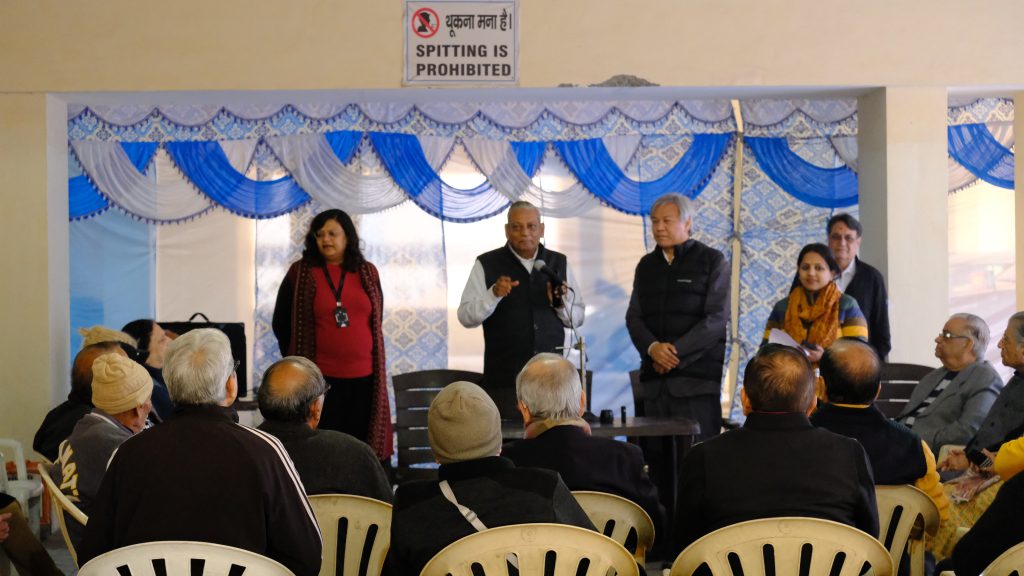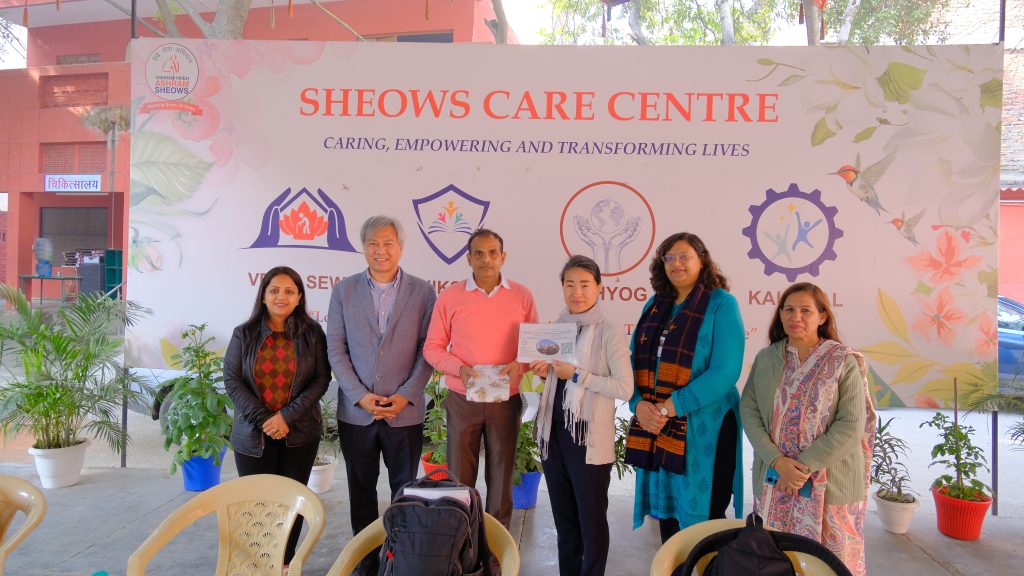21st DIHAC cross-cultural exchange meeting analysis report
Empowering Healthy Ageing and Long-term Care through Digital and Social Pathways in India and Singapore
Silvia Perel-Levin, Myat Yadana Kyaw, Mahendra Kumar Gupta, Saurabh Bhagat, Adrian Tan, Thet Htoo Pan, Nadila Mulati, Vandana Gerg, Myo Nyein Aung
Report in Japanese Report in Thai
Digitally Inclusive Healthy Ageing Communities (DIHAC) is a cross-cultural study primarily based on Japan, Republic of Korea, Singapore and Thailand, and further expanded to India. In this 21st Digitally Inclusive, Healthy Ageing Communities (DIHAC) Study Cross-cultural Exchange Meeting, we invited speakers to learn the distinct cross-cultural approaches to Community Based Social Innovations (CBSI) in India, and Singapore, gaining valuable insights into their respective strategies and innovations. Healthy ageing and long-term care initiatives in India, the world’s biggest population, and digital inclusion initiatives in Singapore, the global and Southeast Asia regional leader in digital economy, are utmost interest for scholars, researchers, professionals and policy makers.
Principal Investigator of the DIHAC study, Dr. Myo Nyein Aung, Associate Professor welcomed all the participants and took an ice break by socializing. More than 70 participants such as researchers, academics, stakeholders, community leaders and PhD students of global health, gerontology, sociology and ICT from over 10 countries participated in the meeting. We are honored to have Ms. Silvia Perel-Levin, International Network for the Prevention of Elder Abuse (INPEA) and International Longevity Centre Global Alliance (ILC GA) main representative to the UN, Geneva, Chair sub-committee on the human rights of older persons. Past Chair, Geneva NGO Committee on Ageing, Geneva as the meeting chairperson.
As an UN advocate, Ms. Silvia’s opening speech was an insightful welcome to the meeting, stating “What happens at the global level has an impact on the policies and activities at the local level. But not enough is linked between the local work, nor translated into our daily practice.” The importance of creating digitally active healthy ageing communities (DIHAC) was highlighted as information and communication technology (ICT) and artificial intelligence (AI) having the potential to improve the well-being of older persons if the autonomy and independence to participation in society are maintained. A human rights-based approach would ensure technology is a means for inclusion rather than a tool for further segregation and exclusion that is so often the case. During the lockdown of COVID-19 pandemic where older persons were more restricted than others, those who had access benefited from ICT in accessing information, services and maintain social connection with family and friends. ICT should be available, accessible, and acceptable without any discrimination, and older persons should be included in the design, training and use of new technologies, not merely being users. Moreover, ICT can support financial autonomy of older persons by using online banking services. Ms. Silvia concluded the opening speech by focusing on support in all micro-, meso-, and macro-levels to include older persons in consultations and policymaking.

Figure: Chairperson Ms. Silvia Perel-Levin, speakers, international audience and DIHAC study team at the 21st DIHAC meeting
DIHAC 21st meeting 1st speaker summary
The first speaker, Mahendra Kumar Gupta, Advocate at the Supreme Court, and President of the Residents’ Welfare Association (RWA) at Woodbury Towers, delivered a presentation on “Healthy Ageing Activities of Residential Welfare Associations in the Neighborhood of Faridabad, Haryana, Delhi NCR.” RWAs are non-governmental organizations formed in the interests of residents of a specific urban or semi-urban area in India. During his talk, he highlighted the community initiatives undertaken by the RWA to support older residents in the area. Referring to the four stages of life in Hindu philosophy, he said that people engage in social and spiritual activities more, in the last two stages, Vanaprastha and Sannyasa. Therefore, RWA activities are designed and arranged to support older people by linking with health and social care services. RWA provides digital training sessions for seniors. Furthermore RWAs organize educational sessions on nutrition by invited doctors and dieticians, and offering basic physical checkups. Additionally, the organization offers physical and emotional support, as well as funeral services, particularly for older individuals who live alone. For social and religious activities, RWA is now arranging programs for seniors to visit religious places for spiritual health. Mr. Gupta Mahendra emphasized the importance of fostering a sense of “family” within the community, treating every resident as a valued member, and thereby creating a supportive and sustainable network for residents and other stakeholders alike. Through collaborations with partner organizations, stakeholders, and governmental organizations, RWAs foster the healthy ageing of older people, advocating human rights for the older.

Figure 2 Mr. Mahendra Kumar Gupta, the President of RWA, and (to the right) DIHAC study team of Associate Professor Myo Nyein Aung Juntendo University and Assistant Professor Vandana Gerg, Manav Rachna International Institute for Research Studies at Senior Citizen club, Charmswood, Faridabad, Haryana
DIHAC 21st meeting 2nd speaker summary
The second speaker for the 21st DIHAC Meeting was Mr. Saurabh Bhagat, CEO of the SHEOWS Foundation. He shared the three-decade-long commitment and effort of the SHEOWS Foundation for abandoned older persons in India. Abandonment or neglect is one form of elderly abuse and is predicted to increase as the population ageing has now become a global phenomenon. In the speech, Mr. Bhagat started with the development of older people’s abandonment in India. It was only two decades ago that the news of older persons’ abandonment became headlines and popular in India. Many factors have contributed to the development of this problem not limiting to changes in social structures from joint families to nuclear families, migration of younger generations for career opportunities and lack of financial security and financial dependency of older people. To tackle the physical, psychological, and social consequences that emerged from the abandonment, the SHEOWS Foundation started as a team of rescuing people in 2003. The team went around the city to look for people who were left on the street without any access to food, medicine, and shelter. The Sheows Foundation provided medical care, food and home for the lost older people with a comprehensive team of medical doctors, paramedics and qualified technicians. Now, the foundation has expanded to provide geriatric care and is planning to collaborate with experts and scholars from Japan and other countries to understand the diversity of ageing care across various cultural contexts. In addition to taking care of homeless seniors, the SHEOWS Foundation also helps reconnect lost older individuals with their families, and more than 3,000 people have been reunited with their families. Mr. Bhagat also discussed how Indian policies and laws have been amended and developed to protect the rights and welfare of older people. The implementation of these policies and laws is still facing challenges and needs proactive measures for older people with cognitively declined older individuals. Mr. Bhagat also added that networks and collaboration to assist in connecting older people in need of help, and these links are crucial for the betterment of care and services. To summarise, the SHEOWS Foundation provides a second home and family for the most vulnerable older people and facilitates them to spend their last decades of life in physically and mentally comfortable surroundings. While providing care for older people, the SHOEWS Foundation also advocates for their rights as the inclusion of older people in developing policies and protecting their rights are fundamental in achieving goals for decades of healthy ageing.

Figure 3: DIHAC study India and Japan teams observing long term care services at SHEOWS Care Home,
DIHAC 21st meeting 3rd speaker summary
In the last and third part of the meeting, Mr. Adrian Tan, Co-founder and Chief Empathy Officer at SG Assist shared his innovative work on “Empowering older Singaporeans’ minds and lives through integrating food rescue with digital inclusion and Gerontechnology ambassadors.” Mr. Tan started the SG Assist social enterprise with the inspiration to help caregivers by volunteering through a mobile app. With this network of volunteers, the “Digital Buddy Program” was launched in collaboration with the marketplace and grocery shops. The volunteers repacked the vegetables and distributed them freely in the neighborhood. Over time, seniors became familiar with the volunteers who in turn educate the seniors on how to use mobile applications such as WhatsApp, Facebook, new messaging channels, and governmental apps including scanning a QR code for contact tracing measures. This behavior changes communication empowered seniors to learn new digital skill every time they participated in rescued vegetables activity. After a year, the seniors actively participated in other social service program as volunteers. This provided micro-job opportunity for seniors including those with disabilities. The Care Agent Program (CAC) designed to empower seniors by training them to be call center agents in emergency situations with emergency awareness skills and technical skills such as usage of Google Workspace. In this way, seniors are engaged in the community and prevented them from social isolation. As a co-variant of the CAC program, the Gerontech Ambassador Program was developed where seniors share their perspectives on technology adoption. Assistive technology is introduced to support the intrinsic capacity of older individuals in daily living, eating, mobility and healthcare, aligned with WHO ICOPE guideline(2). Being seniors themselves, the Gerontech Ambassador could build an inclusive community for peer seniors, caregivers and advocate Gerontechnology, promote engagement, and empower lifelong learning for older individuals.
Closing session
Healthy aging and long-term care services have already been initiated in Singapore and India, especially with the inclusion of marginalized older adults. Chairperson Ms. Silvia Perel-Levin concluded the 21st DIHAC meeting, underlining the importance of the rights for older adults to be included in the society. The chairperson delivered the message “We should challenge the prejudice that just because we are old, we cannot learn or understand technology. We have the right to learn to enjoy life, to age with dignity in the community, and we should be supported to do whatever our condition and wherever we live. We can contribute and have contributed to advancing human rights worldwide. Furthermore, governments and UN agencies should support building capacity of older persons and their organizations and invest in the entrepreneurial endeavors without discrimination of any kind at the global level.”
“Digital technology is not a luxury but a fundamental tool to enable the full enjoyment of human rights and that human rights-based approach is needed throughout the whole continuum from the designing to using ICT.”
Through the social innovations in different cultural contexts of India and Singapore, we could see the integration of community services to create an age-friendly environment. Empowering seniors with digital technology would encourage older individuals to remain in places they are attached to, doing what they believe and value, while maintaining their physical health and social connections, with the ultimate aim of “Aging in Place.” Healthy aging and digital inclusion is important for the sustainability of humanity and the CBSIs shared in the 21st DIHAC meeting will bring insights to other parts of the world. The next DIHAC meeting will be held in April 2024.
References
- WHO Guidelines Approved by the Guidelines Review Committee. Integrated Care for Older People: Guidelines on Community-Level Interventions to Manage Declines in Intrinsic Capacity. Geneva: World Health Organization Copyright © World Health Organization 2017.; 2017
United Nations EaSCfAatPE. ESCAP Population Data Sheet 2023 2023 [Available from: https://www.population-trends-asiapacific.org/population-data.
Authors
Silvia Perel-Levin, M.Sc., is International Network for the Prevention of Elder Abuse (INPEA) and International Longevity Centre Global Alliance (ILC GA) main representative to the UN, Geneva, Chair sub-committee on the human rights of older persons. Past Chair, Geneva NGO Committee on Ageing, Geneva
Myat Yadana Kyaw, M.D., is Ph.D. student at the Department of Global Health Research, Graduate School of Medicine, Juntendo University, Tokyo, Japan.
Mahendra Kumar Gupta, is Advocate Supreme Court, President Residents’ Welfare Association (RWA) Woodbury Towers and Convener of all RWA Charmwood Village, Faridabad
Saurabh Bhagat, is CEO and Sujit Kumar Das Mohapatr, General Manager, Sheows Foundation
Adrian Tan, is Co-Founder and Chief Empathy Officer at SG Assist
Thet Htoo Pan, M.D., is Ph.D. student at the Department of Global Health Research, Graduate School of Medicine, Juntendo University, Tokyo, Japan
Nadila Mulati, M.Sc., is Ph.D. student at the Department of Global Health Research, Graduate School of Medicine, Juntendo University, Tokyo, Japan
Vandana Gerg, MSc is Assistant Professor at Department of Rachna International Institute for Research Studies and investigator of DIHAC study India.
Myo Nyein Aung, M.D., M.Sc., Ph.D. is Associate Professor at the Department of Global Health Research, Graduate School of Medicine, Juntendo University, Tokyo, Japan
